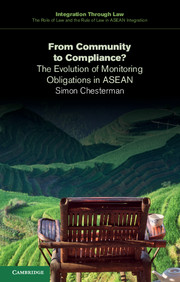Executive Summary
Published online by Cambridge University Press: 05 March 2015
Summary
For most of its history, ASEAN reflected the wariness shown by many Asian states towards international organisations with binding obligations. In the past decade, however, ASEAN has undergone a transformation from a periodic meeting of ministers to setting ambitious goals of becoming an ASEAN Community by 2015. ASEAN has positioned itself at the centre of Asian regionalism through hub and spoke arrangements with China, India, Korea and Japan and is arguably the most important Asian international organisation in the history of the continent.
An important tension in this transformation is the question of whether the ‘ASEAN Way’ – defined by consultation and consensus, rather than enforceable obligations – is consistent with the establishment of a community governed by law. The National University of Singapore's Integration Through Law (ITL) project takes seriously the ASEAN claim to desire compliance with the various obligations that are the foundation of these new communities.
An important part of any compliance regime is the knowledge of what steps towards compliance have in fact been taken. Such knowledge presumes the collection of data on compliance, either for self-assessment or evaluative purposes.
The collection of those data is referred to here as ‘monitoring’. The term embraces any institution, process, or practice (including informal practices) that gathers or shares information about whether or to what extent an ASEAN obligation has been complied with, in the sense of substantive compliance, or implemented, in the sense of formal compliance.
A survey of ASEAN agreements, however, reveals other apparent purposes for monitoring. In addition to assessing substantive and formal compliance (described here as compliance sensu stricto and implementation respectively), monitoring may provide an authoritative interpretation of the content of an obligation or the framework for taking on future obligations. A fourth purpose of monitoring may be the facilitation of long-term implementation through such measures as confidence-building and technology transfers.
- Type
- Chapter
- Information
- From Community to Compliance?The Evolution of Monitoring Obligations in ASEAN, pp. 100 - 102Publisher: Cambridge University PressPrint publication year: 2015



